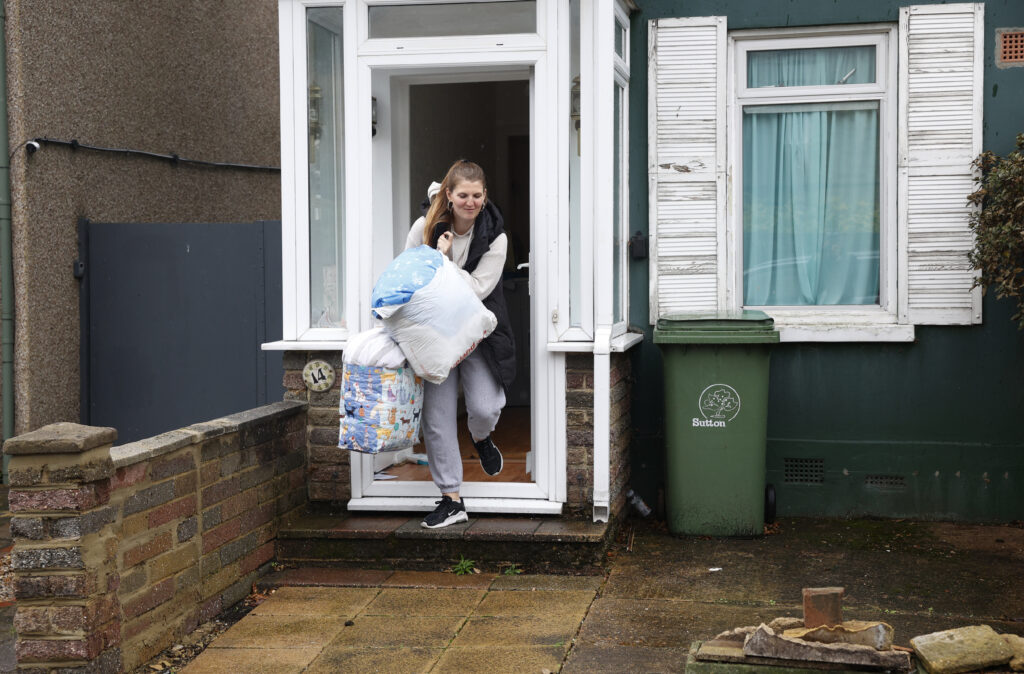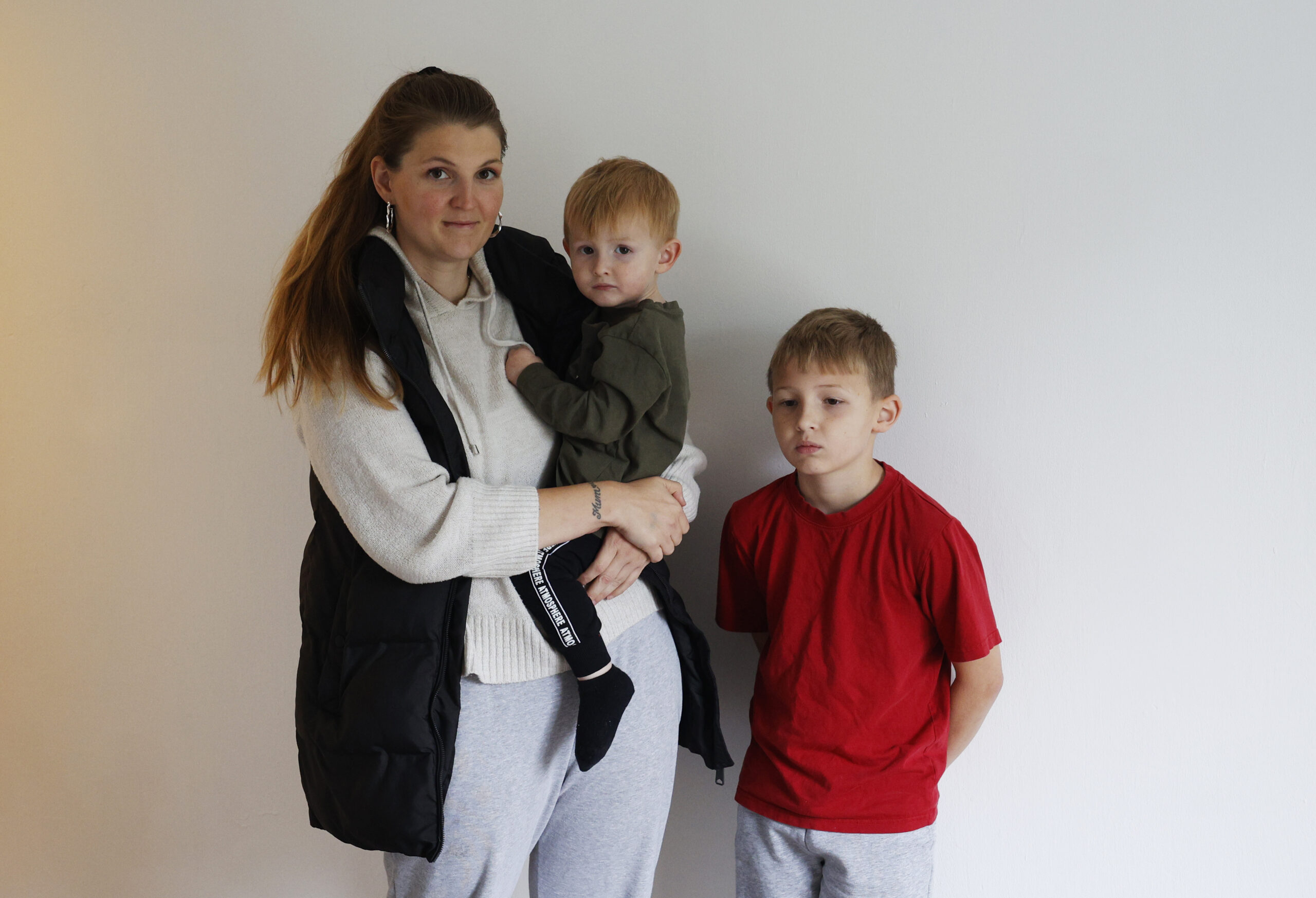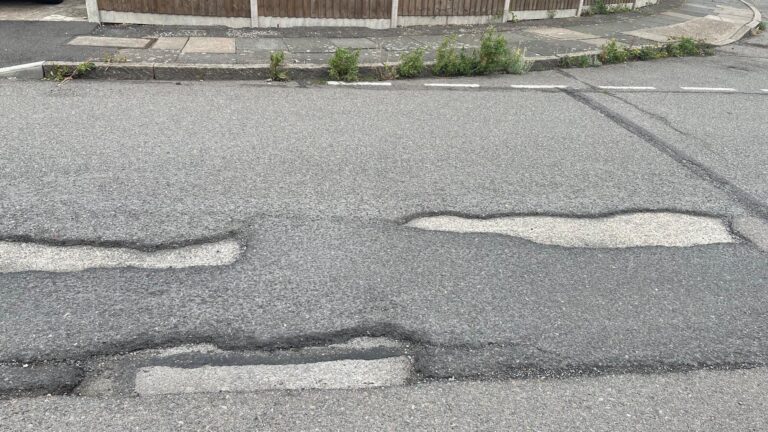A single mother of two who has been in temporary accommodation for 13 years believes her children are suffering from a lack of safe and stable housing. The mum, who experienced homelessness as a teenager, says the upheaval of “constantly moving around” is hurting her and her young family.
As she moves into her latest property in Lambeth this week, it will mark the third time Harlie Swann, 29, and her two children have moved in a month. This, she told the Local Democracy Reporting Service (LDRS) is the reality of living in temporary accommodation.
Originally a Croydon resident, Harlie has had to move her family and possessions between a string of properties in and out of the borough in recent weeks. This seemingly constant change has come from finding out that the properties offered to her by Croydon Council have neither been safe, secure or even sanitary for her family.
During a visit to her former accommodation in Wallington, Sutton, Harlie told the LDRS how the poor conditions in the last two homes have meant she has had to live with her life packed up in cardboard boxes for the past few weeks.
She told the LDRS: “I got told it wasn’t suitable the same day I got here. That is despite the fact that they said it was fine on the paperwork, it was only when we got here that we realised.”
Harlie’s former accommodation, which she was in the process of moving out from on the date of our visit, was deemed unsafe due to it lacking fire-safe windows upstairs and a persistent leak problem. She only discovered these issues on the day of her arrival at the property, at which point a neighbour warned her that the house had had previous temporary tenants who had experienced the same thing.
“They said don’t unpack we’ll find you somewhere else, then they found me this place in Streatham this Monday (Sep 30). It’s an absolute nightmare.”
However, according to Harlie the previous accommodation she was put up in a worse condition. In that property in West Norwood, she had to contend with raw sewage regularly spurting up her sink.
This issue, which required environmental health assessments, was accompanied by persistent mould and damp around the property. Harlie feels the lack of safe and clean housing poses a threat to her family.
Her children, Frankie, 8, and Finnlie, 2, both have special educational needs. Frankie is undergoing regular therapy for ADHD and is currently not attending school due to a previous incident.
This has meant that Harlie has also had to take on an almost full-time care role for her two children, whilst also juggling the logistics of moving her life around. She feels this ‘constant upheaval’ is causing them to struggle, especially Frankie who requires extra support.
She said: “He needs that permanent stability. I go to Child and Adult Mental Health Services (CAMHS) three times a week with him, he is in intense therapy.
“There’s a shortage of ADHD medication at the moment, which means he’s not taking his medication. The school have said they can’t have him there any more because he had an issue with the teachers.
“Because of this I’m having him stay with me at home, but this is all going on at home and they’re expecting me to deal with all of this. It’s too much.”
Organising temporary accommodation, or the emergency interim accommodation in which Harlie currently resides, is the responsibility of the local authority. Emergency accommodation exists to house someone who is at risk of homelessness and is there until the point when a suitable permanent home can be found.
Harlie told the LDRS: “They can make me move out in 24 hours because it’s classed as interim emergency accommodations. It’s not even temporary accommodation, it’s the lowest of the low basically.
“If they then decide I’m moving you again I will have to pack up all my stuff again. I’m in a constant state of not knowing what the hell I’m meant to be doing.”
However, Harlie’s lifelong experience of homelessness and more recent dealings with temporary accommodation have led her to feel that a permanent home is always out of reach. Since the age of 16, Harlie has had a homeless application with Croydon Council and subsequently spent much of her late teens without a permanent roof over her head.
“In between that time, I’ve been in hostels, B&Bs and sofa surfing at my mum’s house. I slept rough as a teenager and was even taken in to sleep in a police cell for the night because I was quite young.
“I saw things that no 16-year-old should have seen by living in these horrible places, and around a lot of concerning people. I feel like I’ve gone through so much but still, nobody is willing to give me and my kids somewhere stable and safe to live.”
Harlie was first moved into temporary accommodation by Croydon Council after having Frankie when she was 21. Single parents with children who are at risk are deemed a high priority, and local authorities have a legal obligation to house them.
Harlie told the LDRS how she ended up living in her first temporary accommodation for seven years, during which time she said “it felt like a home.” However, as Frankie grew up and received his diagnosis the property became unsuitable so they had to move out.
Since then things have been transient, with Harlie saying that it feels like ‘it is just one problem after another.’

She added: “We can’t keep changing that, he needs to be in a set routine and that’s when he does a lot better with his additional needs. This constant upheaval is not fair to him or us as a family.
“The kids also get a lack of attention as well, because my time feels like it’s constantly filled with emails to the council.”
While Harlie admits that some of Croydon Council’s housing staff have been helpful and sympathetic to her situation, she feels they do not understand the harm it is causing her family.
“I have so many letters from the GP, CAMHS, the school and social workers. Nothing like that seems to make a dent with them, nothing seems to help with me getting a more permanent place to stay.”
“I don’t care where they place me, they could place me anywhere. However, because I’ve got them it makes it that much bit harder, especially with all of their requirements.”
For the last nine years, Harlie has also attempted to secure permanent housing via the local bidding system. Despite this, she has so far been unsuccessful in securing a property this way.
She said: “I know so many people that have been in very similar situations to me and they’ve been given their forever homes. I don’t understand why I haven’t been given that yet.”
“I know everybody’s circumstances are different but it hurts.”
Harlie has previously trained to be a teaching assistant and has recently qualified as a parent group leader for local children’s centres. She hopes to return to working in a school but insists this will have to wait while Frankie is out of school.
During the visit to Harlie’s Wallington accommodation, she told the LDRS how the move was also placing her under a financial strain. She has already had to pay for three moving vans in two weeks, a move which in her words has left her with ‘no money left.’
Harlie has now moved into the new property in Streatham and hopes for a period of calm after what has been a tumultuous month. However, she still fears that she could be moved on with short notice if the private landlord changes their mind or something else goes wrong.
Before driving back to Streatham in one of her many cross-borough trips, Harlie told the LDRS: “I’m a good tenant, I’ve always looked after my properties. There just must be a mark against my name, because I constantly feel like I’m at the bottom of the pile.”
Croydon Council was approached for comment but failed to respond in time for publication.





